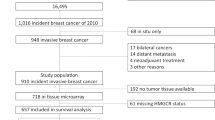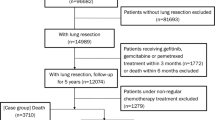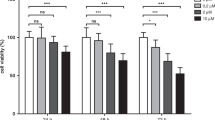Abstract
Background
Long-term use of statins is associated with a small reduced risk of colorectal cancer but their mechanism of action is not well understood. While they are generally believed to act on KRAS, we have previously proposed that they act via influencing the BMP pathway. The objective of this study was to look for associations between statin use and the risk of developing colorectal cancer of a particular molecular subtype.
Methods
By linking two registries unique to the Netherlands, 69,272 statin users and 94,753 controls were identified and, if they developed colorectal cancer, their specimens traced. Colorectal cancers were molecularly subtyped according to the expression of SMAD4 and the mutation status of KRAS and BRAF.
Results
Statin use was associated with a reduction in the risk of developing colorectal cancer regardless of molecular subtype (HR 0.77; 95% CI 0.66–0.89) and a larger reduction in the risk of developing SMAD4-positive colorectal cancer (OR 0.64; 95% CI 0.42–0.82). There was no relationship between statin use and the risk of developing colorectal cancer with a mutation in KRAS and/or BRAF.
Conclusions
Statin use is associated with a reduced risk of developing colorectal cancer with intact SMAD4 expression.
This is a preview of subscription content, access via your institution
Access options
Subscribe to this journal
Receive 24 print issues and online access
$259.00 per year
only $10.79 per issue
Buy this article
- Purchase on Springer Link
- Instant access to full article PDF
Prices may be subject to local taxes which are calculated during checkout


Similar content being viewed by others
Data availability
The data included in this study are available directly from the PHARMO database network (https://pharmo.nl).
References
Graaf MR, Beiderbeck AB, Egberts ACG, Richel DJ, Guchelaar H-J. The risk of cancer in users of statins. J Clin Oncol. 2004;22:2388–94.
Demierre M-F, Higgins PDR, Gruber SB, Hawk E, Lippman SM. Statins and cancer prevention. Nat Rev Cancer. 2005;5:930–42.
Poynter JN, Gruber SB, Higgins PDR, Almog R, Bonner JD, Rennert HS, et al. Statins and the risk of colorectal cancer. N Engl J Med. 2005;352:2184–92.
Dale KM, Coleman CI, Henyan NN, Kluger J, White CM. Statins and cancer risk: a meta-analysis. JAMA. 2006;295:74–80.
Coogan PF, Smith J, Rosenberg L. Statin use and risk of colorectal cancer. J Natl Cancer Inst. 2007;99:32–40.
Bardou M, Barkun A, Martel M. Effect of statin therapy on colorectal cancer. Gut. 2010;59:1572–85.
Goldstein JL, Brown MS. Regulation of the mevalonate pathway. Nature. 1990;343:425–30.
The Cancer Genome Atlas Network. Comprehensive molecular characterization of human colon and rectal cancer. Nature. 2012;487:330–7.
Swanson KM, Hohl RJ. Anti-cancer therapy: targeting the mevalonate pathway. Curr Cancer Drug Targets. 2006;6:15–37.
Kodach LL, Bleuming SA, Peppelenbosch MP, Hommes DW, van den Brink GR, Hardwick JC. The effect of statins in colorectal cancer is mediated through the bone morphogenetic protein pathway. Gastroenterology. 2007;133:1272–81.
Mundy G, Garrett R, Harris S, Chan J, Chen D, Rossini G, et al. Stimulation of bone formation in vitro and in rodents by statins. Science. 1999;286:1946–9.
Hardwick JC, Kodach LL, Offerhaus GJ, van den Brink GR. Bone morphogenetic protein signalling in colorectal cancer. Nat Rev Cancer. 2008;8:806–12.
Kodach LL, Wiercinska E, de Miranda NF, Bleuming SA, Musler AR, Peppelenbosch MP, et al. The bone morphogenetic protein pathway is inactivated in the majority of sporadic colorectal cancers. Gastroenterology. 2008;134:1332–41.
Buurma H, Bouvy ML, De Smet PA, Floor-Schreudering A, Leufkens HG, Egberts AC. Prevalence and determinants of pharmacy shopping behaviour. J Clin Pharm Ther. 2008;33:17–23.
Casparie M, Tiebosch ATMG, Burger G, Blauwgeers H, van de Pol A, van Krieken JHJM, et al. Pathology databanking and biobanking in The Netherlands, a central role for PALGA, the nationwide histopathology and cytopathology data network and archive. Cell Oncol. 2007;29:19–24.
Chan AOO, Jim MH, Lam KF, Morris JS, Siu DCW, Tong T, et al. Prevalence of colorectal neoplasm among patients with newly diagnosed coronary artery disease. JAMA. 2007;298:1412–9.
Jansen L, Below J, Chang-Claude J, Brenner H, Hoffmeister M. Beta blocker use and colorectal cancer risk: population-based case-control study. Cancer. 2012;118:3911–9.
van Eijk R, Licht J, Schrumpf M, Talebian Yazdi M, Ruano D, Forte GI, et al. Rapid KRAS, EGFR, BRAF and PIK3CA mutation analysis of fine needle aspirates from non-small-cell lung cancer using allele-specific qPCR. PLoS ONE. 2011;6:e17791.
Therkildsen C, Bergmann TK, Henrichsen-Schnack T, Ladelund S, Nilbert M. The predictive value of KRAS, NRAS, BRAF, PIK3CA and PTEN for anti-EGFR treatment in metastatic colorectal cancer: a systematic review and meta-analysis. Acta Oncol. 2014;53:852–64.
Chan AT, Ogino S, Fuchs CS. Aspirin and the risk of colorectal cancer in relation to the expression of COX-2. N Engl J Med. 2007;356:2131–42.
Bertagnolli MM, Hsu M, Hawk ET, Eagle CJ, Zauber AG. Statin use and colorectal adenoma risk: results from the adenoma prevention with celecoxib trial. Cancer Prev Res. 2010;3:588–96.
Cheung KS, Chen L, Chan EW, Seto WK, Wong ICK, Leung WK. Statins reduce the progression of non-advanced adenomas to colorectal cancer: a postcolonoscopy study in 187 897 patients. Gut. 2019;68:1979–85.
Voorneveld PW, Reimers MS, Bastiaannet E, Jacobs RJ, van Eijk R, Zanders MMJ, et al. Statin use after diagnosis of colon cancer and patient survival. Gastroenterology. 2017;153:470–9.
Walther A, Johnstone E, Swanton C, Midgley R, Tomlinson I, Kerr D. Genetic prognostic and predictive markers in colorectal cancer. Nat Rev Cancer. 2009;9:489–99.
Alazzouzi H, Alhopuro P, Salovaara R, Sammalkorpi H, Jarvinen H, Mecklin JP, et al. SMAD4 as a prognostic marker in colorectal cancer. Clin Cancer Res. 2005;11:2606–11.
Isaksson-Mettävainio M, Palmqvist R, Dahlin AM, Van Guelpen B, Rutegård J, Oberg A, et al. High SMAD4 levels appear in microsatellite instability and hypermethylated colon cancers, and indicate a better prognosis. Int J Cancer. 2012;131:779–88.
Voorneveld PW, Jacobs RJ, Kodach LL, Hardwick JC. A meta-analysis of SMAD4 immunohistochemistry as a prognostic marker in colorectal cancer. Transl Oncol. 2015;8:18–24.
Funding
This work was funded by the Dutch Digestive Foundation—Grant number WO 09-32.
Author information
Authors and Affiliations
Contributions
SO, RJ, LRAB and PV performed experiments and wrote the manuscript. NW, BW and TW performed experiments. EB and HP performed the statistical analyses. RH, LJACH, LK and HM designed the study. MS critically assessed the manuscript. JH conceived the study, acquired funding, wrote the manuscript.
Corresponding author
Ethics declarations
Ethics approval and consent to participate
Formal Medical Ethical permission for this study was deemed unnecessary after consultation with the Medical Ethical Committee of the Leiden University Medical Centre as it was retrospective and anonymous and complied with the ethical requirements of the 2 databases used, PALGA and PHARMO.
Competing interests
The authors declare no competing interests.
Additional information
Publisher’s note Springer Nature remains neutral with regard to jurisdictional claims in published maps and institutional affiliations.
Supplementary information
Rights and permissions
About this article
Cite this article
Ouahoud, S., Jacobs, R.J., Kodach, L.L. et al. Statin use is associated with a reduced incidence of colorectal cancer expressing SMAD4. Br J Cancer 126, 297–301 (2022). https://doi.org/10.1038/s41416-021-01604-6
Received:
Revised:
Accepted:
Published:
Issue Date:
DOI: https://doi.org/10.1038/s41416-021-01604-6
This article is cited by
-
Cholesterol metabolism and colorectal cancer: the plot thickens
Cell Death Discovery (2024)
-
BRAFV600E-mutated serrated colorectal neoplasia drives transcriptional activation of cholesterol metabolism
Communications Biology (2023)



